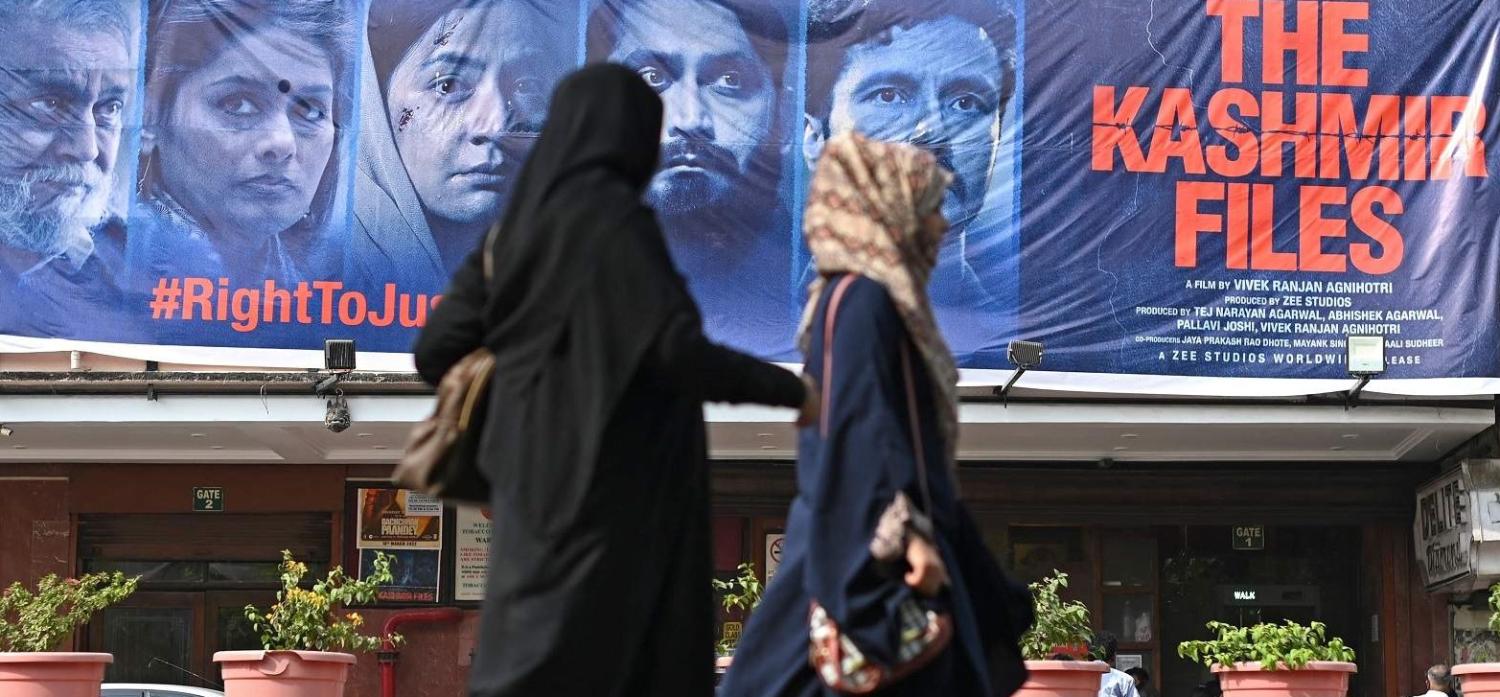Singapore recently banned the controversial Indian film, The Kashmir Files, for its “provocative and one-sided portrayal” of Muslims, citing concerns over its “potential to cause enmity between different communities”. In India, however, the movie has won praise from Prime Minister Narendra Modi and other Hindu nationalist leaders and organisations. Critics have panned the film for blatant Islamophobia and a biased portrayal of history, with themes that align with the Hindu nationalist agenda of the country’s ruling Bharatiya Janata Party (BJP).
The movie depicts the exodus of Kashmiri Hindus – also known as Pandits – from the Kashmir region between 1989 and 1990, during which a violent uprising against India’s rule in Kashmir displaced thousands of people, many of them Hindus. The Kashmir Files follows the fictional story of a young student whose parents have been killed in the riots. However, the filmmaker depicts the event as a genocide – a claim that remains disputed – with Muslims unequivocally seen as the enemy.
Since 2014, when Modi first swept to power under the BJP banner, India has witnessed a marked shift from what had been its core values.
The differing responses to the film from Singapore and India – both once famed for their robust secular constitutions and institutions – signal the divergent pathways the two countries have taken in governing their plural, multicultural societies.
Singapore’s muscular secularism
Singapore’s decisive stance on the film is reflective of its robust, interventionist approach to the management of multiculturalism and diversity in the city state. The governing People’s Action Party in Singapore has long perceived issues of ethnicity and religion as highly sensitive and requiring close management. Academic Walid Jumblatt Abdullah has referred to this as muscular secularism – “a direct, interventionist approach” to ensure “the submission of religion to the overarching authority of the state, rendering the state the final arbiter in all affairs within its borders”.
Speaking in parliament last year, Singapore’s Law and Home Affairs Minister K Shanmugam noted that police reports on racial and religious tension had nearly doubled in 2020. In response to queries about the global rise in religious polarisation, the minister asserted that the Singapore government would continue to be an objective and neutral arbiter and act against anyone sowing enmity or threatening the state’s racial harmony. This includes the use of strong laws such as the Maintenance of Religious Harmony Act, which allows the state to take pre-emptive action on issues related to sustaining a cohesive multi-racial and multi-religious society.

India’s hardening Hindu nationalist agenda
Since 2014, when Modi first swept to power under the BJP banner, India has witnessed a marked shift from what had been its core values. In contrast to the secular principles enshrined in the Indian constitution, the BJP and the Hindu nationalist movement’s Hindutva ideology seeks to create a Hindu Rashtra (nation-state) and carefully defines Hindus as people to whom India is both pitrubhumi (fatherland) and puniyabhumi (holy land), excluding other religious minorities, such as Muslims and Christians, as foreigners. The BJP, with its explicit Hindutva posturing, has been accused of actively promoting anti-Muslim and anti-minority sentiments as part of its mainstream political discourse, affecting the plural fabric of the country.
Hindu vigilante groups, increasingly seen as the legitimate embodiment of majoritarian rule, peddle conspiracy theories such as “love Jihad” (the discredited concept that Muslim men are luring Hindu women into marriage to ensure the dominance of the religion) to further their agenda of cultural policing as part of a systematic campaign to marginalise and vilify Muslims. The Kashmir Files, with its attempt at historical revisionism, is viewed as part of this campaign to increase the existing prejudice towards Muslims in the country.
Singapore and India’s very different responses to a controversial and polarising film are predicated more on how their respective ruling regime perceives its diversity, rather than the veracity of the work.
Modi has backed The Kashmir Files, saying it reflects the “truth” and that there has been a dedicated campaign to discredit the movie. The film has also received a tax exemption for screenings in four Indian states, with the government offering time off for its employees to watch the movie. Despite being mired in controversy for its one-sided perspective of the conflict, the movie’s endorsement by government can be argued as evidence of the growing religious polarisation in India. Emboldened by Modi’s approval, Hindu hardliners were caught on camera after a public screening of The Kashmir Files chanting “Jai Shree Ram” (“glory to Lord Rama” – a proclamation of Hindu faith), and rousing anti-Muslim hate speech that critics said called for genocide and boycotts on Muslim businesses. These developments signal a worrying trend in the country’s path forward to a more uncompromising Hindutva model.
Diverging pathways
Singapore and India’s very different responses to a controversial and polarising film are predicated more on how their respective ruling regime perceives its diversity, rather than the veracity of the work. Both regimes inherently view their multicultural, plural societies as the basis for potential conflict and have taken interventionist approaches. While Singapore favoured a ban as a means of protecting its secularism, the BJP used the film as a way to legitimise its Hindu nationalist discourse, further fracturing communal relationships in an increasingly polarised India.

